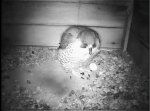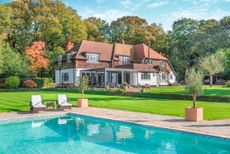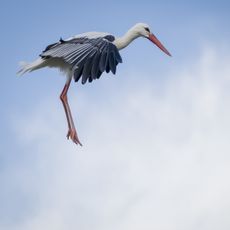More peregrines breeding in UK cities
A peregrine falcon spotted breeding in Birmingham is the first of many expected peregrine nests in British cities


A peregrine falcon egg, spotted in Birmingham, is the first recorded urban egg of 2009. A nest cam captured the nesting female and her egg on Fort Dunlop, where a pair of peregrines have been breeding since 2002.
This is indicative of a growing trend, with more peregrines now nesting on iconic city landmarks across the UK, from the Tate Modern in London and cathedrals in Lincoln and Chichester to Cardiff Clock Tower and Manchester’s Arndale shopping centre.
The RSPB has organised viewing schemes at many of these sites. In Birmingham, images of the nesting peregrine and her offspring will be beamed onto a screen in Victoria Square via the BBC Birmingham website.
Louise Pedersen, from the RSPB’s West Midlands office, says: ‘People never fail to be wowed by the news that most of the fastest and most powerful hunters on the planet lives just above their heads in the city. To get views of them so close up via the camera makes even the most resolute urbanites excited about wildlife.’
Although peregrines are traditionally associated with sea cliffs and crags, changing landscapes have led to them choosing more unlikely places to nest. Tall buildings offer some of the same benefits as cliff faces – height, safety from danger and ample prey in surrounding areas, such as local parks.
British peregrine populations plummeted to just 360 breeding pairs in the 1950s due to factors such as increased pesticides in farming. The RSPB believes that there are now at least 1,500 breeding pairs in the UK, many of which have benefited from finding urban homes.
The RSPB’s Date With Nature scheme offers people the chance to view wildlife in unusual places. As well peregrines in cities, people can see nesting herons in East Anglia, more than a hundred red kites feeding in Wales, a red deer herd in Suffolk, starlings roosting on Brighton Pier or white-tailed eagles in Scotland, among others.
Sign up for the Country Life Newsletter
Exquisite houses, the beauty of Nature, and how to get the most from your life, straight to your inbox.
Project manager Richard Bashford says: ‘The UK has some of the most incredible wildlife in the world. The RSPB scheme shows some of the best we have to offer. Everyone loves nature and sometimes you don’t realise how close you are to it.’
For details of 2009’s 50 Date With Nature schemes, visit www.rspb.org.uk/datewithnature
To view images from the Birmingham peregrine nest cam, visit http://www.bbc.co.uk/birmingham/content/webcams/peregrine_falcon_live_webcam.shtml
To comment on this article, use the comment box below, or email us at clonews@ipcmedia.com. Read more about the countryside
Country Life is unlike any other magazine: the only glossy weekly on the newsstand and the only magazine that has been guest-edited by HRH The King not once, but twice. It is a celebration of modern rural life and all its diverse joys and pleasures — that was first published in Queen Victoria's Diamond Jubilee year. Our eclectic mixture of witty and informative content — from the most up-to-date property news and commentary and a coveted glimpse inside some of the UK's best houses and gardens, to gardening, the arts and interior design, written by experts in their field — still cannot be found in print or online, anywhere else.
-
 A well-connected rural playground with 23 acres on the edge of the South Downs National Park
A well-connected rural playground with 23 acres on the edge of the South Downs National ParkOld House Farm is an impressive family home with a wealth of amenities that would inspire any rural passion.
By Arabella Youens Published
-
 The UK gets its first ‘European stork village’ — and it's in West Sussex
The UK gets its first ‘European stork village’ — and it's in West SussexAlthough the mortality rate among white storks can be up to 90%, the future looks rosy for breeding pairs in southern England.
By Rosie Paterson Published
